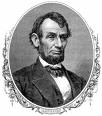 One thing leads to another as I have had occasion to mention. Another article led me to quote Abraham Lincoln’s famous saying about not being able to fool all of the people all of the time – a saying that all politicians should repeat to themselves every day – and to find a few other rather good ones.
One thing leads to another as I have had occasion to mention. Another article led me to quote Abraham Lincoln’s famous saying about not being able to fool all of the people all of the time – a saying that all politicians should repeat to themselves every day – and to find a few other rather good ones.
It is, of course, debatable whether Lincoln was a conservative. The conclusion one comes to is much like the conclusion one comes to on most politicians: depends on what you mean by conservative.
Freedom from slavery, all slavery, is an important part of conservative thinking now, though it was not necessarily so in the middle of the nineteenth century. Tory Historian has just acquired a copy of Jeremy Black’s latest work (how does the man do it?) on the slave trade and is looking forward to reading it and sharing opinions with readers of this blog.
At the launch Professor Black made the straightforward and obvious comment that slavery has been the norm throughout most of history. One might argue that it has never been completely abolished in some parts of the world either in the state or private form.
What is unusual, though Professor Black did not say it, is the assumption developed in parts of the western world in the middle of the eighteenth century that slavery in any shape and form was wrong.
Going back to Lincoln, though, his views on trade – he was a complete protectionist and believer in high tariff, which was one of the causes of the War Between the States – would have delighted some Tories and the odd Conservative now. Others run from the idea in great terror. When they stop running they point out that most Anglospheric countries have done extremely well under free trade arrangements.
Given his shenanigans with the Supreme Court, it is hard to take Lincoln’s solemn pronouncements about the sanctity of the Constitution too seriously but here is one quotation that Tory Historian is sure will appeal to lots of readers:
This country, with its institutions, belongs to the people who inhabit it. Whenever they shall grow weary of the existing government, they can exercise their constitutional right of amending it, or exercise their revolutionary right to overthrow it.Here is another one that is singularly apposite to events in the world at the moment:
The shepherd drives the wolf from the sheep's for which the sheep thanks the shepherd as his liberator, while the wolf denounces him for the same act as the destroyer of liberty. Plainly, the sheep and the wolf are not agreed upon a definition of liberty.Indeed, the sheep and the wolf rarely agree on anything.
Abraham Lincoln is about as far from conservative as you can get. He became President of a strong but free association of states and turned it, by force of might, into a unitary state. He attacked the ancient rights and privileges of the American people by suspending habeas corpus in contravention of the Constitution. He arrested and imprisoned newspaper editors who dared challenge his diktats. He enacted the Lieber Code which legitimized what we now think of as "total warfare" including attacks on the civilian population. 600,000 Americans were killed in Lincoln's war.
In effect, he destroyed the Republic and replaced it with another, altogether more sinister and inimical to the Constitution and to tradition. He should be remembered as the tyrant he was. At the name of Lincoln, all lovers of liberty and freedom should spit.
On the other hand, his self-propaganda has lived on with remarkable success. Surely that makes him the patron saint of the modern Conservative Party.
Does Andrew Cusack vilify William Pitt (the younger)on the same grounds ?
Lincoln was a conservative. What he wanted to conserve was constitutional democracy. If the party that loses an election can detach itself and form its own country, democracy is meaningless. The South lost an election, so a faction in the South started killing people. Lincoln, the commander in chief was responsible for preserving domestic order, which he proceeded to do. He succeeded in conserving the constitution, democracy and the unity of the country which had been handed down by the founders. That is conservative enough.
At the name of Lincoln all lovers of freedom over force, of ballots over bullets, of lawful authority over threats of violence and intimidation, should bow their heads in gratitude.
We are a constitutional REPUBLIC.
We are a constitutional REPUBLIC.
If conservative means a belief individualism and personal freedoms than Lincoln was a conservative. If liberal, progressive, means a belief in a centralize state and federal power than he was a liberal.
Lincoln was a whig, and above all a great man to be exemplified and remembered.